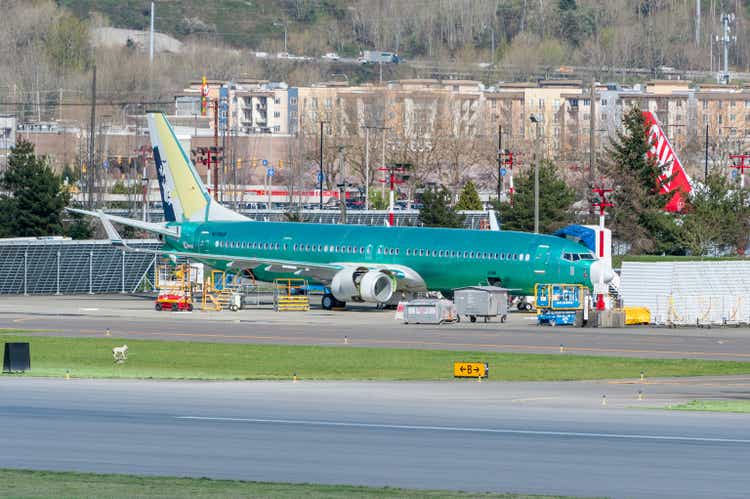
dmfoss
Boeing’s (NYSE:BA) next chief executive, Kelly Ortberg, will start on August 8 amid a variety of challenges the aerospace and defense giant is working to overcome. While Ortberg’s appointment as CEO removes one area of doubt for investors, there are still significant questions about Boeing’s (BA) future, according to a report by financial-services company Morgan Stanley.
“Bullish investors see current operating results to be closer to trough than peak,” Kristine Liwag, analyst at Morgan Stanley, said in an August 1 report. “However, bearish investors are concerned about Boeing’s (BA) long-term earnings power.”
Cash-Flow Scenarios
The company this year has been burning cash because deliveries of its best-selling 737 Max were capped after a near-catastrophe in January. Investors are looking for a sign that Boeing’s (BA) free cash flow will turn positive in the next 18 months.
“What is a reasonable free-cash-flow ramp-up in 2025? How realistic is a $10 billion free-cash-flow target and what operating conditions need to occur for Boeing (BA) to realize this target?” the Morgan Stanley report said.
The bank forecasts Boeing (BA) will generate $5.39 billion of free cash flow in 2025 and $6.74 billion in 2026.
Doubts about Boeing’s (BA) cash flow raise the specter that the company will need to possibly raise cash by issuing stock or selling bonds. Boeing (BA) went deeply into debt to sustain itself during the collapse in air travel as the coronavirus pandemic raged.
Another key issue how much the 777X widebody plan will cost as Boeing (BA) prepares for its first delivery. The company has a backlog of 540 orders for the redesigned plane.
| Boeing (BA) gross orders for 777X | |
| Customer | Sum of Quantity |
| Air India | 10 |
| All Nippon Airways Co., Ltd. | 19 |
| ANA Holdings Inc. | 1 |
| British Airways | 18 |
| Cargolux Airlines Internationa | 10 |
| Cathay Pacific Airways | 21 |
| Emirates | 262 |
| Ethiopian Airlines Group | 8 |
| Etihad Airways | 25 |
| Lufthansa | 27 |
| Qatar Airways | 74 |
| Silk Way West Airlines | 2 |
| Singapore Airlines | 31 |
| Unidentified Customer(s) | 32 |
| Grand Total | 540 |
Boeing (BA) also is in the process of acquiring key supplier Spirit AeroSystems (SPR), whose operating expenses are another source of doubt for investors, according to Morgan Stanley. Boeing (BA) in 2005 had spun out Spirit (SPR) into a separate publicly traded company as part of a cost-cutting measure. Concerns about product quality and supply-chain efficiency have pushed Boeing (BA) to seek the acquisition.
Labor Contract
Meanwhile, thousands of aircraft machinists have threatened to strike as their labor contract nears its September 12 expiration date.
“Some of the terms the union is asking for include a 40% pay increase over three years and reinstatement of Boeing (BA) pension with retroactive credit for years of service since 2014,” according to Morgan Stanley. “How should we think about the potential incremental operational costs as a result of this agreement?”
After Boeing (BA) reaches higher production rates for the 737 Max and 787 Dreamliner, investors will want to understand the cash economics of the programs “as customer discounts tail off and the higher supply chain inflation and labor costs are factored in,” Morgan Stanley said.
Finally, the long-term ability of Boeing’s (BA) defense and space segment to generate cash is another area of uncertainty, according to Morgan Stanely.
